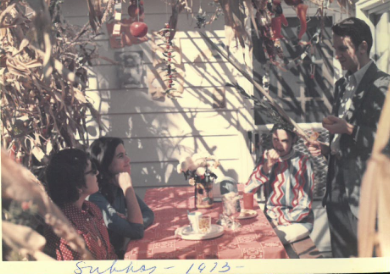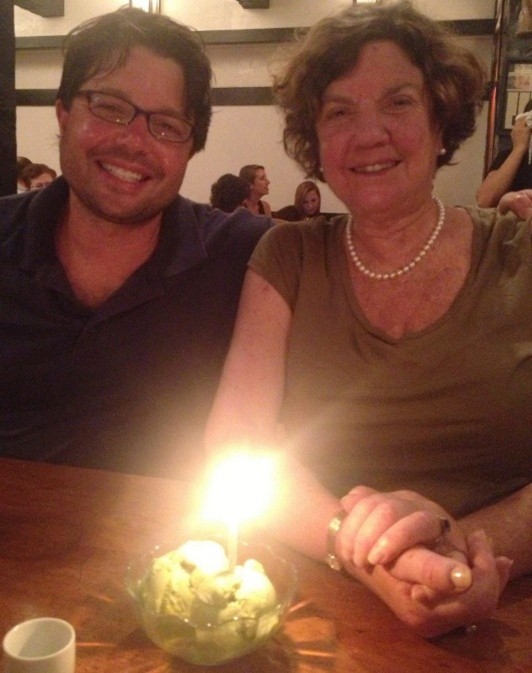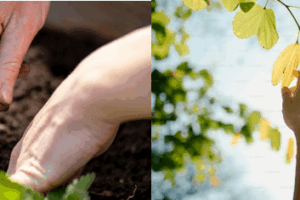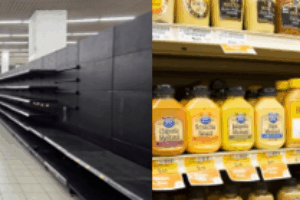Opening Haiku
Not the years she had,
but the life she poured in them —
still filling our hearts.
As I reflect on my mom’s (of blessed memory) tenth yahrzeit, I am reminded of a small wooden plaque that sat on her desk and now rests on mine (from Mom’s desk plaque):
“It’s not the years in your life, but the life in your years.”
That simple phrase captures her spirit. It returned to me this Sukkot, when I celebrated with my friend Koby, who gathers remarkable scholars and spiritual seekers beneath the sukkah’s shade while enjoying his wife Rivka’s delicious culinary creations. One guest, named Yisrael, shared a story that has stayed with me.
In a small town, two neighbors lived side by side — one rich, one poor. The rich man possessed every comfort but no joy. The poor man, though lacking possessions, filled his home with music, laughter, and weekly Shabbat spirit. His table overflowed not with food, but with gratitude.
When Sukkot came, the rich man grew jealous of his neighbor’s radiant joy. Determined to prevent him from building a sukkah, he ordered the townspeople not to give the poor man even a scrap of wood. Yet on the first night of Sukkot, the poor man’s sukkah stood proudly, glowing with light and song.
“How did you build it?” the rich man demanded.
“I found the wood in the cemetery,” the poor man replied.
The rich man scoffed — until he stepped inside and examined each board, carved with names and dates. Then he froze: one plank bore his own name, his birth date … but no date of death.
Startled, he asked, “How did you get this?”
“When no one would help me,” the poor man said, “the Angel of Death appeared, carrying a grave marker — for you. I pleaded for your life, asking to use that unfinished plank for my sukkah roof instead.”
And so the rich man’s life was extended. He realized his days were not infinite gifts to hoard but sacred opportunities to celebrate — and he devoted the rest of his years to joy and generosity.
After Rosh Hashanah this year, my favorite older brother Laurence invited me to play golf with his friend Bennet. On the first tee, I asked, “How were your holidays?”
Bennet said his rabbi had given a moving sermon about tombstones. Each bears two dates, birth and death, but, the rabbi explained, the true meaning lies in the dash “–” between them. That dash is your life. Live your dash fully.
As a writer, my mom taught me the wisdom of words. In her passing, she has taught me the power of punctuation — how it can serve as a metaphor for life, and beyond.
- Periods mark quiet endings.
- Exclamation points mark emphatic ones.
- Question marks express curiosity and doubt.
- Commas connect thoughts — a breath between moments.
- Ellipses teach continuity and love — that a soul goes on.
- Colons open possibilities.
- Parentheses hold tangients — but that’s another story.
- And the most sacred mark, the semicolon; not an end, but a pause before continuing a new beginning, a moment to gather strength for renewal.
The semicolon echoes the soul’s endurance — when life gives you reason to stop, yet you choose to go on. It is resilience, remembrance, and rebirth.
What if every tombstone ended with a semicolon — a symbol of legacy, an opening toward eternity?
My Mother’s Double Portion
When I spoke at my mom’s funeral in 2015, I quoted 2 Kings 2: Elisha asks Elijah, “Let me inherit a double portion of your spirit.” I asked for that same gift from my mom.
Ten years later, I realize she granted it.
She gave each of us a double portion of her soul — a faith that keeps multiplying. She taught us to leave our sukkah standing an extra week, to stretch joy a little longer, to make more room for love and memory.
I remember that final Sukkot with her. I left my sukkah up an extra week so she could see it before I took it down. After she passed, I found her own words about keeping hers up longer — extending holiness just a little further:
“This year I kept it up for two more weeks and reluctantly decided tomorrow would be the day. Then I got a reprieve, as my husband invited someone over to see it — an older Jewish couple who were so touched to see a sukkah today. They were moved to see us, the younger generation, recreating something from their past in this modern present.
Now I feel I have again seen the cycle of life and it is time to tear the sukkah down for this year. I think of Ecclesiastes 3: There is a time to build and a time to tear down that which was built. Eventually, all that was ever true before will be true again. For those who seek new meaning to life — it’s all there.”
The sukkah itself is a metaphor, a sukkah of abundance and a sukkah of vulnerability in the wilderness. Hashem gave the children of Israel the first Shabbat, and it is only through faith in God that we can hold humility during times of abundance, and hug and heal our hearts in moments of sadness and fragility.
Ten years ago today, I could speak only of pain and the blessings of the past. Today, I can hold both — the ache of her absence and the blessing of her continued presence.
My mom left us not with a period, certainly not a question mark, and most definitely not an exclamation point. She left us with a semicolon — a pause that invites us to carry her story forward and write our own.
My mom’s favorite expression was never “The early bird gets the worm.” She taught me instead:
“The early bird gets the early worm, the late bird gets the late worm. There is always another worm.”
The dates on her tombstone may mark a beginning and an end, but her life’s chapters live in the dash — with the semicolon and beyond it; in every extra helping, extra week, extra kindness, and extra measure of life she taught us to give.
Now, as I sit at my desk and gaze at her small wooden plaque, ‘It’s not the years in your life, but the life in your years,’ I feel her presence guiding my typing on her keyboard which I saved from her writing desk and have continued to use to this day. I light the yahrzeit candle beside it, its flame flickering like a comma before lifting upward again.
Not a period.
Not a question mark.
Not an exclamation point.
A semicolon ; a sacred pause, and a promise to keep living.
Closing Haiku
Years fade into light,
but her semicolon glows on ;
pause, then live again.
My mom’s interview on Howard Stern in the late 1990s. Such a revealing insight into my mom’s and our family legacy of standing firm and expressing our opinions, with humor and humility.
My mom’s blog about Succot and photo from 1973 at our succah

You can read about my thoughts on the afterlife here.

My mom’s favorite recipe…Chocolate Matzo Mousse Cake.






